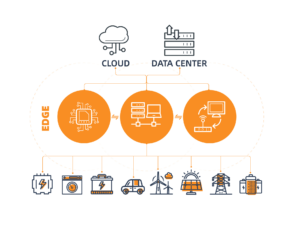EdgeX Foundry is an open-source edge computing platform managed by the Linux Foundation’s LF Edge project. This platform is designed to bridge the gap between IoT devices and the cloud, enabling data to be processed close to its source, thereby reducing latency and improving real-time decision-making capabilities. EdgeX Foundry’s modular microservices architecture offers great flexibility and scalability, making it suitable for various industry use cases. The platform’s open-source nature ensures that it can adapt to different environments, allowing organizations to avoid vendor lock-in and deploy it on any hardware, operating system, or cloud service.
Architecture of EdgeX Foundry
EdgeX Foundry’s architecture is designed to be highly flexible, scalable, and secure. It comprises several key components that work together to manage data flow, device communication, and security.

1. Device Services: The Bridge Between Devices and Applications
Device Services in EdgeX Foundry serve as the interface between the platform and the IoT devices it manages. These services collect data from sensors, actuators, and other IoT devices, translating it into formats that the platform’s other components can process. EdgeX Foundry supports various protocols such as Modbus, BACnet, MQTT, and REST, ensuring compatibility with a wide range of devices, from industrial machinery to consumer electronics.
The flexibility of Device Services is one of EdgeX Foundry’s strengths, allowing developers to create custom services tailored to specific devices or use cases. This capability is particularly valuable in industries where legacy systems need to be integrated with modern IoT technologies.
2. Core Services: The Heart of EdgeX Foundry
Core Services form the backbone of the EdgeX platform, managing data flow and ensuring the system operates efficiently. Key components include:
- Core Data: Stores and manages the data collected from IoT devices, acting as a persistence repository to ensure that data is available for further processing or transmission to other systems.
- Metadata: Maintains information about the devices connected to the platform, including their configurations and capabilities. This information is crucial for ensuring that the platform can communicate effectively with each device.
- Command Service: Facilitates communication between the EdgeX platform and IoT devices, allowing for remote control and actuation. This service is essential for applications requiring real-time control of devices or sensors.
- Message Bus: An internal messaging system that enables fast and efficient communication between different EdgeX services, ensuring data is transmitted to where it is needed without delays.
3. Supporting Services: Enhancing Edge Computing Platform Functionality
Supporting Services provide additional functionalities that enhance the overall capabilities of the EdgeX platform. These include:
- Rules Engine: Allows for real-time data processing and decision-making at the edge. Users can define rules in SQL format to process data as it is collected, enabling immediate responses to events such as sensor readings exceeding a certain threshold.
- Scheduler: Manages timed operations across the platform, ensuring tasks are executed at the right time. This is particularly useful for applications requiring periodic data collection or device maintenance.
- Notification Service: Alerts operators or systems to specific events, ensuring that critical information is communicated promptly. For example, an alert might be sent if a sensor detects an anomaly or if a device goes offline.
4. Application Services: Connecting Edge Data to External Systems
Application Services are responsible for processing and forwarding the data collected at the edge to external systems such as cloud platforms, enterprise applications, or on-premise data centers. These services provide the necessary tools to integrate EdgeX with other systems, ensuring seamless data flow across different environments. Application Services include:
- Configurable Application Service: A pre-built service that allows users to configure data delivery to various endpoints without needing custom coding. It supports standard endpoints such as RESTful APIs, MQTT brokers, and cloud services like Microsoft Azure and AWS.
- Application Functions SDK: For more complex requirements, developers can use the Application Functions SDK to build custom application services tailored to their specific needs.
5. Security Services: Ensuring Data Integrity and Privacy
Security is a critical aspect of any edge computing platform, and EdgeX Foundry provides robust mechanisms to protect the data and devices under its management. Key security features include:
- Secret Store: Securely manages credentials, tokens, and certificates used by the platform’s microservices. This centralized approach to secret management ensures that sensitive information is protected from unauthorized access.
- API Gateway: Serves as the primary interface for external access to the platform, acting as a barrier between EdgeX services and external clients. It controls access to the platform’s REST APIs, ensuring that only authorized users can interact with the system.
Benefits of Using EdgeX Foundry
EdgeX Foundry offers several significant advantages, making it an ideal platform for edge computing in IoT deployments.
1. Flexibility and Adaptability
EdgeX Foundry’s vendor-neutral, open-source design allows it to be deployed across a wide range of environments. This flexibility enables organizations to leverage existing infrastructure, avoid vendor lock-in, and adapt the platform to meet specific business needs. Whether deployed on-premise, in the cloud, or in a hybrid environment, EdgeX can be tailored to suit the unique requirements of different industries.
2. Enhanced Interoperability
One of the biggest challenges in IoT is achieving interoperability between devices and systems from different manufacturers. EdgeX Foundry addresses this challenge by supporting a wide range of protocols and providing tools for integrating legacy systems with modern IoT technologies. This interoperability is crucial for industries like manufacturing, where disparate systems must work together seamlessly to optimize operations.
3. Robust Security
Edge computing often involves processing sensitive data close to its source, making security a top priority. EdgeX Foundry includes comprehensive security features that protect data both in transit and at rest. By securely managing credentials and controlling access through the API Gateway, EdgeX ensures that only authorized users can interact with the platform. This makes it suitable for industries with stringent security requirements, such as healthcare, finance, and energy.
4. Support for AI and Machine Learning
As AI and machine learning become increasingly integrated into IoT deployments, the ability to process data at the edge becomes more important. EdgeX Foundry supports the deployment of AI and machine learning models at the edge, enabling real-time analytics and decision-making. This is particularly valuable in applications requiring low latency, such as autonomous vehicles, predictive maintenance, and smart manufacturing.
Use Cases of EdgeX Foundry

EdgeX Foundry’s versatility and robust feature set make it suitable for a wide range of applications across various industries. Below are some examples of how EdgeX Foundry is being used to address real-world challenges:
1. Manufacturing: Enhancing Efficiency and Reducing Downtime
In the manufacturing sector, EdgeX Foundry is used to monitor and control industrial equipment, helping to prevent downtime and optimize production processes. By processing data at the edge, manufacturers can detect equipment failures before they occur, implement predictive maintenance strategies, and optimize production processes in real-time. EdgeX Foundry’s ability to integrate with legacy systems also makes it easier for manufacturers to modernize their operations without significant overhauls.
For instance, in a factory setting, EdgeX Foundry can collect data from various sensors installed on machinery to monitor parameters such as temperature, vibration, and pressure. This data is then processed in real-time, and if any anomalies are detected, the system can trigger alerts or even automatically shut down equipment to prevent damage. This proactive approach reduces the likelihood of costly downtime and ensures that production lines operate efficiently.
2. Smart Cities: Improving Urban Efficiency and Safety
EdgeX Foundry plays a crucial role in the development of smart cities, where it is used to manage data from a wide array of sensors and devices, such as traffic cameras, environmental sensors, and public transportation systems. By processing this data at the edge, cities can improve traffic flow, reduce energy consumption, and enhance public safety.
For example, EdgeX Foundry can be deployed to monitor traffic conditions in real-time. Data from traffic cameras and sensors can be processed at the edge to identify congestion patterns, allowing for dynamic adjustments to traffic light timings. This reduces traffic jams and improves overall urban mobility. Additionally, environmental sensors can monitor air quality and noise levels, providing city planners with the data needed to implement measures that improve the quality of life for residents.
3. Healthcare: Supporting Remote Monitoring and Telemedicine
In the healthcare industry, EdgeX Foundry is used to support remote patient monitoring, telemedicine, and smart medical devices. By processing patient data at the edge, healthcare providers can deliver faster, more accurate diagnoses and treatments, improving patient outcomes. EdgeX Foundry’s security features also ensure that sensitive patient data is protected, making it a reliable platform for healthcare applications.
For instance, EdgeX can be used in a telemedicine setup where patients’ vital signs data (such as heart rate, blood pressure, and blood glucose levels) are collected in real-time through wearable devices. This data can be processed directly on the device or on a local server in the hospital to immediately detect abnormalities. If an abnormality is detected, such as an arrhythmia, the system can instantly alert the doctor or even trigger an emergency response protocol, increasing the patient’s chances of survival.
4. Retail: Enhancing Customer Experience
Retailers use EdgeX Foundry to enhance customer experience through real-time data analysis and personalized services. For example, in-store kiosks equipped with EdgeX can analyze customer behavior, track inventory levels, and provide personalized product recommendations. This real-time data processing allows retailers to quickly respond to customer needs, increasing customer satisfaction and driving sales growth.
In a retail setting, EdgeX Foundry can help stores optimize their layout and product placement by monitoring and complete the translation:
In a retail setting, EdgeX Foundry can help stores optimize their layout and product placement by monitoring and analyzing customer shopping behavior. For instance, by collecting and analyzing data on where customers spend the most time in the store, retailers can identify high-traffic areas and strategically place products to maximize sales. Additionally, the data can be used for dynamic pricing and promotional activities, further enhancing profitability.
5. Energy and Utilities: Optimizing Distributed Energy Resources
In the energy sector, EdgeX Foundry is used to manage and optimize distributed energy resources, such as solar panels, wind turbines, and smart grids. By processing data at the edge, utility companies can balance energy supply and demand more effectively, reduce operational costs, and improve the reliability of energy distribution. EdgeX Foundry’s support for AI and machine learning enables advanced analytics, such as predictive maintenance and energy forecasting.
For example, in a smart grid environment, EdgeX Foundry can collect and analyze real-time data from multiple energy generation points, such as solar panels and wind turbines. Based on real-time data, utility companies can dynamically adjust energy distribution to ensure grid stability and reduce energy waste. Moreover, EdgeX Foundry’s predictive maintenance capabilities can forecast potential equipment failures and schedule maintenance in advance, preventing power outages and other incidents.
The Future of EdgeX Foundry and Edge Computing
As IoT adoption continues to grow, the importance of edge computing will only increase. EdgeX Foundry is well-positioned to play a significant role in this evolution, particularly with the anticipated integration of AI and machine learning capabilities, enabling more complex real-time analytics and decision-making. As 5G networks become more widespread, the demand for edge computing solutions like EdgeX Foundry will likely increase, as 5G’s low latency and high bandwidth capabilities make it an ideal complement to edge computing.
Moreover, the EdgeX Foundry community is continuously working on improving the platform, with regular updates and new features being added to address emerging challenges and opportunities in edge computing. This ongoing development ensures that EdgeX Foundry remains at the cutting edge of technology, capable of meeting the evolving needs of diverse industries.
EdgeX Foundry is a powerful and versatile platform that is transforming how organizations approach edge computing. Its open-source nature, combined with its robust features and strong community support, ensures continuous innovation and relevance in an ever-evolving technological landscape. As edge computing becomes increasingly vital to the success of IoT initiatives, platforms like EdgeX Foundry will be indispensable in driving this shift, enabling businesses to achieve greater efficiency, security, and innovation.
By enabling real-time data processing, improving interoperability, and providing comprehensive security, EdgeX Foundry helps businesses across various industries optimize operations, reduce costs, and improve customer satisfaction. As the importance of edge computing continues to rise, platforms like EdgeX Foundry will play a crucial role in shaping the future of IoT and the broader digital economy.
Recommended Reading
- Edge AI with TinyML & OpenMV – Discover how TinyML enables AI at the edge.
- Choosing the Best Open-Source IoT Platform for Development – Find the top open-source IoT platforms ranked by GitHub stars.
- ZedIoT’s Edge AI Development Services – Explore how we provide expert solutions for IoT and AI at the edge.


